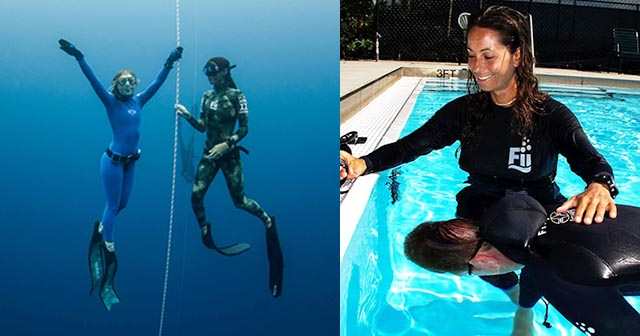New to Freediving? Here’s Where to Start.
by - May 20th
So, you’ve seen a few images on Instagram or in the media about freediving and think that it’s something you’d love to try, but it seems too overwhelming. After all, there is expensive gear to buy, and everyone on the online forums is telling you to start with this “apnea walk drill” or that “CO2 table.” Sounds complicated, right? Well, it’s not when you take a step back and look at freediving as you would any skill-based sport.


Learning the basics of any skill-based sport will start you off on the right path and help ensure that it’s an enjoyable experience. In freediving, there are primary skills that allow you to start freediving to depth comfortably, and more importantly, to do so safely. These primary skills can be learned in just one and a half days, and no preparation is required! The FII Level 1 freediver course encompasses these skills and is usually hosted over a Saturday and Sunday, making it rather accessible. During this class, key freediving information and skills are carefully explained, and then you have the chance to practice in the pool before applying the skills in an open-ocean setting. The average results of this course are comfortably freediving to 66 feet and having a breath-hold of 2-3 minutes after just one and half days! The benefit of the FII program is that it follows a standardized system, meaning no matter which instructor leads your course, you’re guaranteed to receive the same quality FII training.
Why can’t I just learn freediving from the Internet?
While a great deal of information about all sports is out there in some shape or form, an extreme sport puts lives at risk. Therefore, it is paramount to learn a new extreme sport from a certified professional to ensure that you don’t miss any important information. Learning from a professional also ensures that the sport is enjoyable from the get-go, as you won’t waste your time taking “stabs in the dark” or risk your life or your friends life by making a mistake.
Is there an age limitation?
We know many divers who discovered this sport in their sixties and won’t stop gushing about their newfound love for it. If you love the ocean, used to freedive in your youth, or simply want to try a new low-impact sport, try freediving! It’s a natural extension of enjoying the ocean and is much healthier for the body than strapping on the heavy tanks that are required for other forms of diving.
What gear do I need?
While there are many gear manufacturers out there that tout their products with all sorts of claims, such as fins that offer “extra length to give you maximum propulsion” or the “lowest volume mask to help you equalize deeper,” the truth is that in the beginning, you can learn to freedive with standard snorkeling gear and a warm quality wetsuit. For this reason, the FII Level 1 freediver course doesn’t require you to use freediving-specific gear. All you need is a pair of fins, mask, snorkel, wetsuit, weight belt and a few one and two pound weights, most of which can be rented at a local dive shop. What is more important at this entry-level stage is mastering a solid technique and acquiring a knowledge foundation. After learning about freediving-specific equipment during your course, you can make an educated purchase in the future.
What do I do now?
So, you enjoyed the course and want to keep freediving; what do you do now? Find a local spearfishing or freediving group with freedivers who are certified by a recognized freediving agency (i.e., they know how to save your life in an emergency situation and they are trained to freedive safely). Many FII instructors offer regular pool and ocean training sessions for certified freedivers that provide a safe environment in which you can continue your training. FII boasts the largest freediving and spearfishing community in the United States making it easy to find local certified buddies and training sessions. Don’t be fooled by someone claiming to be “highly experienced” who has no proof of formal training. While there are many uncertified people out there who have managed to avoid a fatal situation in their years of spearfishing or freediving, don’t be tempted to test their skills when your life is at stake.
Freediving is a healthy and natural way to enjoy the underwater world, and it’s available to everyone to enjoy. Dedicate one weekend to master the basics of the sport, and watch a whole new world open up in front of you!
